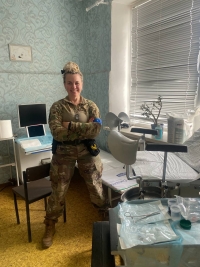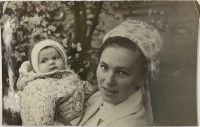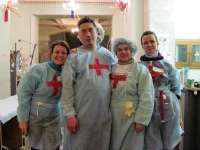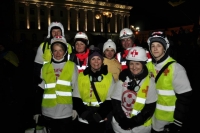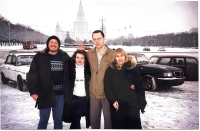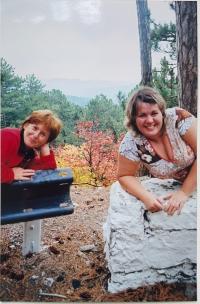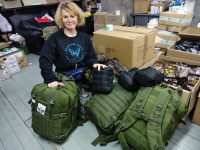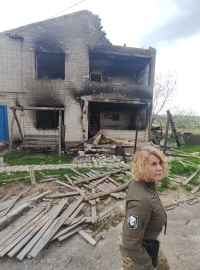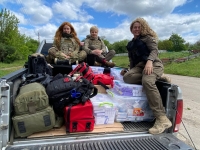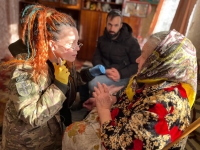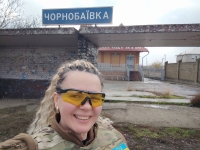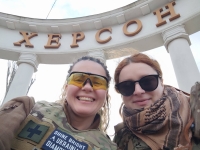“Village Bezruky. Where there has been no electricity for five months, where the outpatient clinic has remained, it survived. But there is... there is no one to work. There is a nurse’s assistant, and then later a nurse appeared. We arrived, started asking who needs help, what, where... And we were given certain addresses. We went there, looked at these people. And then they say: “There are a few houses beyond the railway, and in one of the houses, there is an elderly couple. They both have diabetes and they really need someone to check on them”. Plus 40 degrees outside, heat, August, everything as expected. Explosions on the horizon, drones flying above us periodically. We arrive there. I enter this house. There are a grandmother and grandfather, the grandmother is around 80, the grandfather even older. I check their blood sugar levels. Hers, with diabetes it should be around 8, but hers is 25. And she feels very unwell. I ask: “Do you have insulin?” She says: “We do have insulin, but it should be kept in cold. There is no electricity, the refrigerators are not working, we keep it in the cellar.” Well, in the cellar, it's about 15 degrees, so this insulin is no longer effective. It doesn't work. I leave them insulin pens that are stored at a temperature of 24, explain how to use them, and tell the husband everything. And after that—it was such a difficult trip—we go back to Kharkiv. And they tell us, they call Tania, they say: “There is an opportunity today to meet with the head of the Kharkiv Department of Health. <...> And you happen to... you've been in Kharkiv region for three days now, you have something to tell him. Maybe you go there and tell him”. And we're like: “Of course, yes, we'll come now”. We arrive. And in our team—it's a small team—I'm the only doctor, I'm the only one with medical education. And we come in, a beautiful office, everything is fine, a nice chart, a chart showing what's occupied, what's not... And then: thank you, you are such good people. We ask: “What about humanitarian aid?”—"With humanitarian aid, everything is bad”. Or rather, it's like “everything is bad”. They have solutions and some consumables for surgeries. But through the “Accessible Medicines” system, no one sends humanitarian aid from abroad because these are medications that cannot be bought there without a prescription. Therefore, in order to deliver them, it requires a complex transfer scheme. And they don't receive these medications. And what we do is simply distribute them directly to people and give them medication for blood pressure, diabetes, and other conditions. And he says: “Look, I have everything set up so well. Yesterday, I had discussions about VR goggles, about telemedicine, that our patients in Kharkiv will be consulted from Los Angeles. Look at how beautiful and cool everything is here". And sitting next to me is Tania Tymoshenko—former director of “Dobrobut” [a network of private medical clinics]. She was one of the organizers of disaster medicine, and now she works at the WHO. And she's holding my leg under the table. In other words, she understands that I'm turning red, that I'm going to... I'm going to go all out and show everyone. She's holding my leg, saying: “Natasha, calm down”. I can't take it anymore, I say: “What VR goggles are you talking about? We have just been in a village where there is no electricity, no insulin, and people are dying from diabetes. They don't need consultations from Los Angeles at all. They need insulin, electricity, refrigerators, or some mobile medical teams that come there, provide medical assistance, leave medications, and go back. Because we came from Kyiv to you. Do you have cars in Kharkiv? There are cars. Why can't you put doctors in them and send them there?” “Because they're shooting there, they won't go there”. “I understand. Have you asked? Maybe there is someone who would go? Because I go there, I go as a volunteer, nobody pays me any money for it. I go because I can't do otherwise”. And he says: “I can't find anyone, nobody goes”. I say: “Then why the hell do you need VR goggles when you can't even provide basic necessities for your territory?” In short, it's about what can be changed”.

